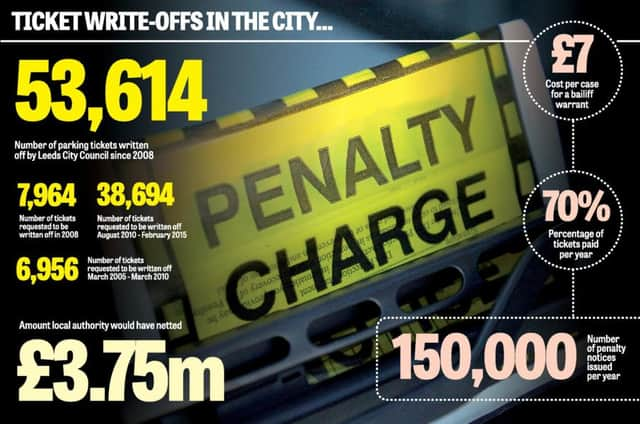Fiasco as Leeds Council writes off 50,000 parking tickets worth £3.75m


Since 2008, the council has classed a total of 53,614 fixed penalty notices as bad debts because they were deemed unlikely to be paid off and not cost-effective to chase.
Council chiefs say they were “unrecoverable” because either a bailiff has been unable to get payment or because the vehicle owner could not be traced. Leeds City Council could have lost out on up to £3.75m based on the current fixed penalty charges for parking offences of £70 and £50, depending on the severity of the breach. The council’s parking services department has made six requests to the authority’s director of environment and housing to write off unpaid parking tickets since decriminalised parking enforcement was introduced in 2005. The first request in 2008 was for 7,964 tickets to be written off. It was followed by five more applications, made between August 2010 and February this year, for a total of 38,694 tickets. The latest successful request, which was made last week, was for 6,956 parking tickets issued between March 2005 and March 2010.
Advertisement
Hide AdAdvertisement
Hide AdParking manager Mark Jefford wrote in the latest report: “These debts are unrecoverable, either because the bailiff has been unable to gain payment or because the owner of the vehicle cannot be traced. This includes foreign registered vehicles. A bailiff warrant lasts for one year only and costs £7. These warrants have expired in the cases listed here so any further recovery action would cost a further £7 per case with no realistic chance of recovering the money.”
Mr Jefford said the council currently issues around 150,000 penalty charge notices a year, of which around 70 per cent are paid.
A council spokesman said: “This report relates to old tickets where we have done all we can to recover the debt, but for various reasons, which include non-traceable vehicles and owners, have been unsuccessful.
“They are therefore deemed irrecoverable as it is no longer an effective use of taxpayers’ money to continue to chase the debt as the cost of recovering the debt would be more than the debt itself.”